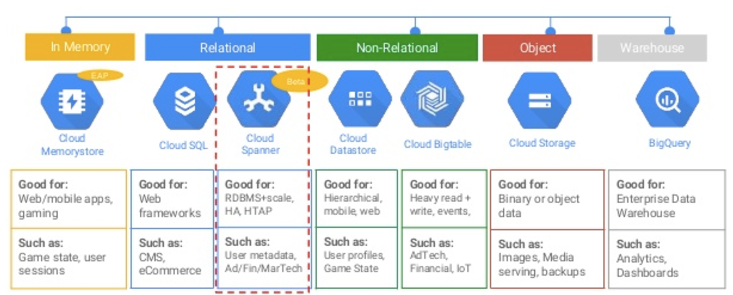but internals are more similar to NoSQL databases, scaling horizontally, no downtime.
From outside it behaves as a single server, but in fact it is globally distributed.
And it is production grade, tested for many years on Google scale.
In fact GCP itself runs on Spanner.
Cloud Spanner | Automatic Sharding with Transactional Consistency at Scale | Google Cloud Platform
"Cloud Spanner is the only enterprise-grade, globally-distributed, and strongly consistent database service built for the cloud specifically to combine the benefits of relational database structure with non-relational horizontal scale. This combination delivers high-performance transactions and strong consistency across rows, regions, and continents with an industry-leading 99.999% availability SLA, no planned downtime, and enterprise-grade security."
Cloud Spanner 101: Google's mission-critical relational database (Google Cloud Next '17) - YouTube
Cloud Spanner 201: getting the most out of Cloud Spanner (Google Cloud Next '17) - YouTube
Spanner, the Google Database That Mastered Time, Is Now Open to Everyone | WIRED
"...they equipped Google's data centers with a series of GPS receivers and atomic clocks...
...This gives you faster-than-light coordination between two places," says Peter Mattis, a former Google engineer who founded CockroachDB, a startup working to build an open source version of Spanner."
Google Research Publication: Spanner (original paper explaining how it works)
Discover on Google Cloud Spanner – DeepQ Research Engineering Blog – Medium

Google's Cloud Spanner: how does it stack up? | ZDNet
"...Spanner is a relational database, geared to operational OLTP (online transactional processing) workloads, with full ACID (atomicity, consistency, isolation and durability) functionality. Spanner's not a simple scale-up relational database service -- that's where Google Cloud SQL comes in. Spanner is not a data warehouse; Google BigQuery is designed to handle those workloads. And it's not a NoSQL database, either, as BigTable is Google's offering there.
So Spanner contrasts strongly with Amazon's DynamoDB, which is a NoSQL database employing so called "eventual consistency," and Microsoft's Cosmos DB, also a NoSQL database, and one which is configurable along a full spectrum of consistency models, ranging from an ACID model on one end to eventual consistency on the other, and two more consistency models in between."
Cloud Database Wars: Google Spanner vs. Microsoft CosmosDB | Simplilearn
Google Cloud Spanner vs. Microsoft Azure Cosmos DB Comparison
Practical Tradeoffs in Google Cloud Spanner, Azure Cosmos DB and YugaByte DB
A Chart Comparing Azure Cosmos DB Amazon DynamoDB and Google Cloud Spanner
GCP Spanner public features have changed since this chart was created...
No comments:
Post a Comment